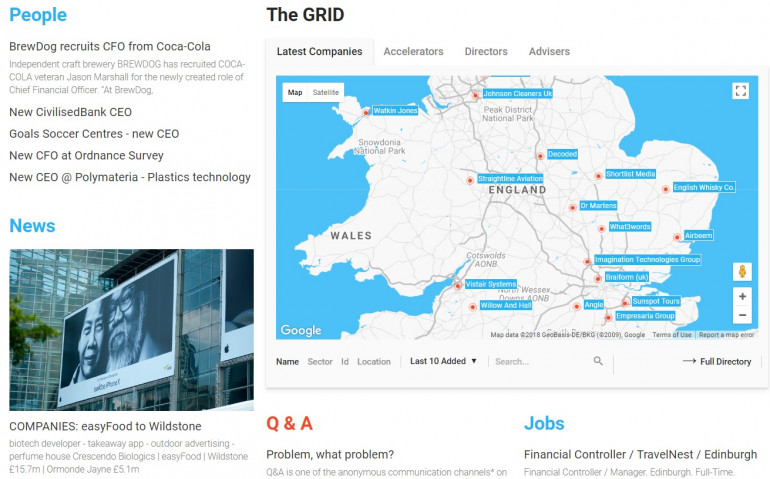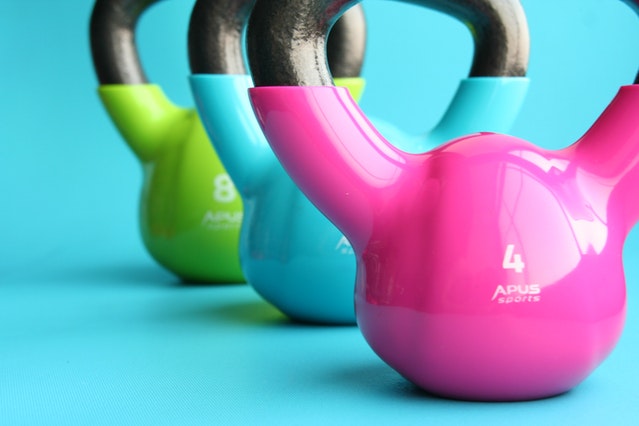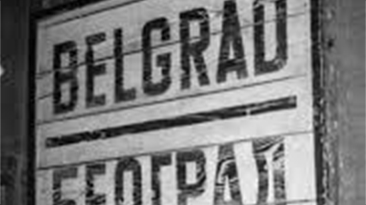Published by Directorzone Markets Ltd on January 9, 2017, 9:00 am in News, Other
Wednesday January 1st 2020

News about 5 UK growth companies and/or accelerators + turnover in the GRID marketplace, 1st -7th January 2017:
Eldon Insurance Services £33m | DC Thomson £275m | Gail’s | Nutricare £8.5m | Timpson £130m
ELDON INSURANCE SERVICES: Tycoon who bankrolled Brexit lines up £250m float | Daniel Dunkley, The Sunday Times. January 1 2017
DZ profile: Eldon Insurance Services Ltd
Business: car and home insurance business which trades under the name GoSkippy. Provides insurance policies for high street names including the department store Debenhams and focuses on customers with high premiums, such as sports car owners. It sold 181,000 policies during the year.
Launched: 2007
Location: Bristol
Founder: Arron Banks, 50, controversial Ukip donor. Banks owns nearly all of the business, pushing him comfortably into The Sunday Times Rich List with an estimated fortune well in excess of £100m. His business empire — controlled by a network of offshore companies — now includes a number of diamond mines in South Africa.
Financials: made an operating profit of £300,000 on turnover of £33m in 2015.
News:
1. Eldon is expected to list on the junior AIM market for a £250m float in the first half of 2017. Advisers are likely to be appointed to handle the sale within the next few weeks.
2. Banks made his first fortune from the creation and sale of Brightside Group, another Bristol-based insurance company. Brightside listed in 2011 and was then bought by the private equity firm AnaCap for £130m in 2014.
Banks set up Eldon after being pushed out by the Brightside board shortly after the float. The outspoken tycoon has previously bragged about how he lured many of Brightside’s staff to work for his new operation. Eldon is a direct competitor to Brightside.
DC THOMSON: Dennis the Menace hands family behind Beano £20m | Tommy Stubbington, The Sunday Times
DZ profile: D.C. Thomson & Company Limited
Business: publishing empire controlled by the Thomson family. As well as the Beano, DC Thomson produces Scottish newspapers including The Courier and The Sunday Post, and magazines such as My Weekly and The People’s Friend.
Launched: 1905
Location: Dundee, Scotland
Financials: increased its dividend despite a decline in profits, which fell 17% to £24.2m. Although revenue climbed 12% to £275m, helped by new titles in the magazine sector.
News:
1. Latest annual accounts show that the final dividend for 2016 rose to £15.3m from £14.8m a year earlier, taking the total for the year to £19.8m. The bumper payout is good news for the Thomson family, which is worth £1.28bn according to The Sunday Times Rich List.
2. DC Thomson profit was hit by rising paper costs and falling newspaper advertising revenues related to problems in the Aberdeen oil industry. This dampened the performance of The Press & Journal and Evening Express, the Scottish oil capital’s two main papers.
3. The company’s newspaper sales declined by 2.1%. In August DC Thomson closed its London office, shifting jobs back to Scotland. The move marked the closure of the last newspaper office on Fleet Street.
GAIL’S: All you knead to know to make loads of dough | Emma Broomfield, The Sunday Times.
DZ profile: Bread Holdings Limited
Business: artisan bakery. Launched in Hampstead, northwest London, today Gail’s has 34 bakeries in London, Oxford and St Albans, and sells through Waitrose and Ocado.
Launched: 2006
Location: London
Founder: Tom Molnar, 50,
Staff: 550
Investment: Believers include Sunday Times columnist Luke Johnson, whose Risk Capital Partners invested £10.5m in 2011.
News:
The baking revolution is also shaking up the restaurant industry. Last month Gail’s co-founder Emma King, 39, used her knowledge about good dough to launch Radio Alice, a pizzeria in Hoxton, east London. King has joined forces with Italian restaurateurs Salvatore and Matteo Aloe for the venture. The restaurant, which unlike most pizza joints leaves its dough to ferment for 24 hours, has already caught the attention of Azzurri Group, the operator of ASK Italian and Zizzi, which has invested an undisclosed amount.
NUTRICARE: Chinese taste for baby milk nurtures Cumbria town | Andy Bounds, FT.
DZ profile: Kendal Nutricare Ltd
Business: Kendamil powdered baby milk business. Nutricare, the new name for the business, also retained contracts to make infant cereals such as porridge for Heinz, providing a third of its turnover, and sells to north Africa and Southeast Asia. The milk comes from 220 farms in northern England, Scotland and Northern Ireland.
Launched: 2015
Location: Kendal, on the edge of the Lake District
Founder: After months of negotiations Irish entrepreneur, Ross McMahon, 52, a food scientist, persuaded Heinz to sell to him its powdered baby milk plant that had sustained hundreds of Kendal’s working families as well as infants worldwide for 50 years. He will not disclose the price but admits it was cheap; it would have cost the US multinational £6m to close it. Heinz bought the facility from Boots in 1998 for £94m, he says. It was built by GlaxoSmithKline to make its Farley’s range in 1962.
Staff: The factory employs 120 but remains at about one-fifth capacity. There were 88 workers left when bought the plant, after Heinz laid off 170 people in four rounds of redundancies in the previous years.
Financials: It is breaking even, Mr McMahon says. Turnover should rise from £8.5m in the year after the takeover to £12m this year.
Investment: Mr McMahon invested millions, hired extra staff and created new brands. …he used the proceeds of property investment in London to buy the business and relies on just a small overdraft. He said he had invested £1.3m and the plant was breaking even.
News:
1. It’s biggest coup was to gain Chinese accreditation for Kendamil. The factory is one of only 75 in the world allowed to export products there. China now accounts for about a third of the business. “Kendamil is more famous there than it is here,” he says. “We are in 2,000 stores.” “The value in this business is the Chinese registration. A Chinese investor would buy this in a heartbeat. But I want to keep it for the people of the town and grow it. What you cannot buy is the years of expertise here.”
2. However, the UK market has proved harder to crack. Kendamil has the highest AA quality rating from the British Retail Consortium but shelf space is dominated by Cow and Gate and Aptamil, owned by Danone of France, and Nestle’s SMA. Only Booths, a small independent in north-west England, and 50 kosher shops in London stock Kendamil, though it is sold online. Other companies can spend millions on marketing, and most customers stick with known brands.
3. As the only domestic manufacturer, Mr McMahon wants the government to force packaging to declare in which country the formula is made. He also claims it is better quality because he has switched from skimmed to whole milk, so it contains less vegetable oil than other brands.
4. Nutricare has an in-house product team and is now entering the lucrative adult protein food market with Kendalife, a whey-based nutrition drink with fruit flavours. An organic infant formula will follow next year.
5. The government has been supportive. The company has been on trade missions with the Department for International Trade and received £590,000 from the Regional Growth Fund for expansion. It wants to hit £31m turnover by 2020.
TIMPSON: buys Royal dry-cleaners | Joanna Bourke, Evening Standard. January 5
DZ profile: Timpson Limited
Business: Key-cutting and shoe repairs firm Timpson with nearly a third of revenues from concessions in Tesco and Sainsbury’s stores. 1,325 owned stores and 110 "Snappy Snaps" franchises throughout the UK and Ireland.
Launched: 1865
Location: Manchester
Founder: William Timpson
Staff: 3,400. Family owned and run by John Timpson as Chairman and James Timpson as Chief Executive.
Financials: For the year to the end of September 2015 Timpson’s sales increased 8pc to £130m; pre-tax profits rose by 65pc from £6.2m to £10.3m; Operating profits rose from £6.1m in 2014 to £10.3m.
News:
1. today bought Jeeves of Belgravia, dry cleaners to the Royal Family, as part of an £8.3 million acquisition from Johnson Service Group. As well as the purchase of the upmarket Royal Warrant holder, which has eight London branches and a number of international stores, the deal includes retail arm Johnson Cleaners UK. Combined, the Johnson dry-cleaning business generated sales of £46.2 million in 2015. It has around 200 stores. Johnson Service Group’s boss Chris Sander said the disposal would help the firm to concentrate on expanding its textile rental arm, which provides linen for hotels and restaurants.
UPDATE:
The best place for my shops? Near the loos and McDonald’s | Oliver Shah, The Sunday Times. August 2,0 2017
2. about 10% of Timpson’s workers are ex-offenders hired straight from prison. In 2003, Timpson was invited on a tour of Thorn Cross jail, near Warrington. Impressed by the inmate who showed him around, he offered him a job. Since then, Timpson has hired hundreds of former prisoners. Some have done “lots of serious crimes”. The only ban is on sex offenders — “I just think that’s a step too far”. ...on the whole he believes that “the people we find in prison are more loyal, more honest and work harder than the people we recruit off the street”.
3. Sales at the company’s 1,925 sites, which include the photo printers Max Spielmann and Snappy Snaps, rose by about 5% to £205.2m in the year to last October. Pre-tax profits jumped by a third to £20.2m and shareholders — the Timpson family, led by James’s father, John, who is chairman — received £12.1m of dividends.
3. ... the malaise afflicting high streets across Britain. James Timpson: “Outside London and places like Stratford-upon-Avon, rents are coming down and down,” he adds. “In the suburbs of industrial cities, rents are halving. If you’re a landlord, it’s horrendous.” If you’re a tenant with small stores offering high-margin services such as iPhone repairs, it’s propitious — particularly if you don’t need prime pitches. Timpson’s favourite spot is “next to the toilets and McDonald’s, because you actually get good footfall but it’s slightly off the beaten track”. This year’s revaluation of business rates, which generally rebalanced the tax burden away from less affluent areas, will also help.
4. 45-year-old James Timpson. His father and late mother, Alex, fostered almost 90 children and adopted two. One of his brothers, Edward, was a Tory MP until he lost his seat to Labour by 48 votes in May. (Timpson gave £121,000 to Edward’s constituency office last year.) James worked as a roadie and a door-to-door salesman before joining the family outfit at 24.
5. A retail insider describes the business as “amazing”, but questions whether its self-confidence sometimes leads to a lack of healthy introspection. The company’s current incarnation began in 1983, when John secured private equity backing for a buyout from Hanson. The asset-stripping conglomerate had acquired Timpson as part of United Drapery Stores, which took over the operation in 1972 after a “toxic” row between family members that saw James’s grandfather ousted as chairman. Struggling with the buyout costs and poor trading, John sold Timpson’s shoe shops in 1987 to focus on key-cutting and shoe repairs. After expanding into dry cleaning, engraving, photo processing and watch repairs, he bought out minority shareholders in 1993.
6. John — who was knighted this year for services to business and fostering — developed what he called his upside-down management technique, which involves giving power to shop staff. They are allowed to take up to £500 from the till to settle a customer complaint and to set their own prices. Staff — or colleagues, as Timpson prefers to call them — share 15% of their stores’ weekly profits when the sales exceed 4.5 times the wage bill. They also enjoy free use of 12 holiday homes, in places such as Snowdonia and Turkey.








